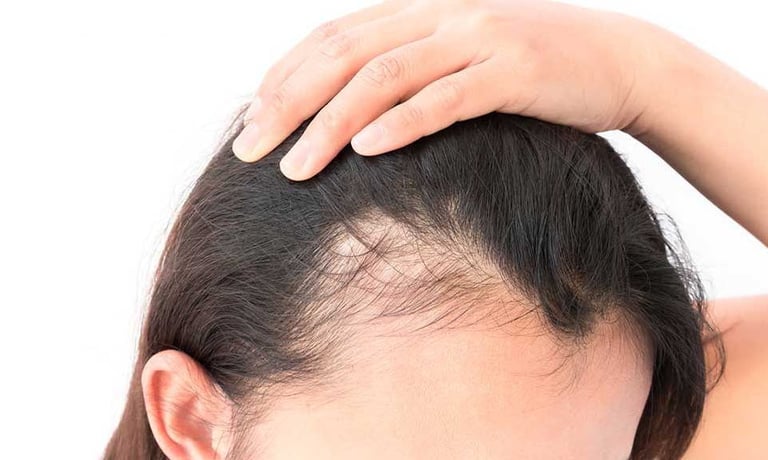Understanding the Most Common Causes of Hair Loss in Men and Women
Descrives the most common causes of hair loss.
9/1/20246 min read


Hair loss is a common concern that affects millions of people around the world. While it's often considered a cosmetic issue and typically not covered by insurance, it can significantly impact one's self-esteem and emotional well-being. Understanding the causes of hair loss is crucial for finding effective treatments and managing expectations. This blog post explores the most common causes of hair loss in both men and women, providing insights into how they can be addressed.
1. Genetic Factors (Androgenetic Alopecia)
The most prevalent cause of hair loss in both men and women is genetic, known as androgenetic alopecia, or pattern baldness. In men, this condition typically presents as a receding hairline and thinning at the crown, eventually leading to bald patches. Women, on the other hand, usually experience diffuse thinning across the entire scalp, rather than bald patches. In women, this condition typically presents with thinning that begins at the part line and begins to spreads from there.
Androgenetic alopecia is linked to the sensitivity of hair follicles to dihydrotestosterone (DHT). DHT is a hormone that is created through a series of reactions in the body that begin with cholesterol, which is converted into testosterone in the testes and ovaries. It also happens in other parts of the body, such as the liver, brain, salivary glands, lungs, heart, and pectoral muscle. DHT is prevalent in the causation of baldness because it circulates in the bloodstream and binds to androgen receptors, which are located in abundance on the top of the head.
The enzyme 5-alpha-reductase then reduces testosterone in target tissues to form DHT. The amount of DHT in the body is related to the amount of testosterone available for conversion. As a result, when testosterone levels increase, so do DHT levels. On average, adults convert about 10% of their testosterone into DHT each day.
This sensitivity shortens the hair growth cycle and weakens hair follicles over time. Genetic predisposition plays a crucial role, and while it cannot be entirely prevented, treatments like low-level laser therapy, microchanneling, growth factor/stem cell/exosome treatments, minoxidil, finasteride, PRP/PRF injections, and hair transplant surgery can help manage its effects.
For info on available treatments for Androgenic Alopecia
@ Hair Health Institute in Meridian, ID.
2. Hormonal Imbalances
Hormonal changes can trigger significant hair loss, particularly in women. Conditions such as polycystic ovary syndrome (PCOS) and thyroid imbalances (like hypo/hyperthyroidism) often lead to hair thinning.
PCOS: This condition causes elevated levels of androgens (male hormones) in women, leading to thinning hair on the scalp and excessive hair growth in other areas.
Thyroid Disorders: Both an overactive thyroid (hyperthyroidism) and an underactive thyroid (hypothyroidism) can disrupt the normal hair growth cycle, resulting in hair loss.
Hormonal changes related to pregnancy, childbirth, and menopause can also impact hair growth. Postpartum hair loss is a common issue for new mothers, which usually resolves on its own within a few months. However, a trichologist can provide help in minimizing the severity of hair loss if consulted at the first signs of excessive shedding.
3. Nutritional Deficiencies
Proper nutrition is vital for healthy hair growth. Deficiencies in essential nutrients can lead to hair thinning and loss. Key nutrients for hair health include:
Iron: Anemia or low iron levels can cause hair loss, as iron is crucial for producing hemoglobin, which carries oxygen to hair follicles.
Vitamin D: A deficiency in vitamin D can lead to hair loss, as it plays a role in the hair growth cycle. Vitamin D needs to be above 60 ng/ml for healthy hair growth
Biotin and Zinc: Both are essential for maintaining healthy hair, and deficiencies can lead to brittle hair and thinning. Zinc needs to be above 80 ng/ml for healthy hair growth
Ferritin: an essential mineral that plays a crucial role in the growth and maintenance of healthy hair. It is responsible for carrying oxygen to the hair follicles, which is necessary for their growth and vitality. A deficiency in ferritin can lead to hair loss and even hair thinning. Ferritin needs to be above 70 ng/ml for healthy hair growth.
A balanced diet rich in these nutrients can support healthy hair growth. In some cases, dietary supplements may be recommended, but it's best to consult a healthcare provider before starting any new regimen.
4. Stress and Trauma
Emotional and physical stress can have a profound impact on hair health. Conditions like telogen effluvium are often triggered by significant stress or trauma, such as illness, surgery, or emotional distress. This condition causes hair follicles to enter the resting phase prematurely, leading to noticeable shedding 2-3 months after the stressful event.
Examples of stress that can lead to hair loss include emotional stress, such as anxiety, depression. Traumatic events, such as illness, surgery, or rapid weight loss, can also contribute to hair loss. Additionally, lifestyle factors like poor diet, lack of sleep, and excessive smoking or drinking can further exacerbate the problem. When the body is under stress, it can disrupt the hair growth cycle, leading to increased shedding and thinning of the hair. Chronic stress can also contribute to other hair loss conditions, such as trichotillomania, where individuals pull out their hair as a coping mechanism. It's important for individuals experiencing hair loss to address the underlying causes of their stress and seek professional help if necessary. Taking steps to manage stress through relaxation techniques, exercise, and healthy lifestyle choices can also help prevent further hair loss.
5. Medical Treatments and Medications
Certain medical treatments and medications can lead to hair loss as a side effect. Chemotherapy, for instance, is notorious for causing hair loss due to its impact on rapidly dividing cells, including those in hair follicles. While hair can usually regrow after treatment, the process can be distressing.
There are over 100 medications that can contribute to hair loss, such as anticoagulants, antidepressants, and drugs used for high blood pressure and high cholesterol, which may also contribute to hair thinning. If you suspect a medication is causing hair loss, consult with your healthcare provider. They may be able to adjust your dosage or prescribe an alternative treatment.
6. Autoimmune Diseases
Autoimmune conditions, where the immune system attacks the body's own tissues, can cause significant hair loss. Some of the most common autoimmune diseases that can cause hair loss are: alopecia areata, lupus, and thyroid disorders like Hashimoto's and Graves' disease.
Alopecia areata: characterized by sudden, patchy hair loss. This condition can affect individuals of any age and may result in complete scalp or body hair loss in severe cases.
Lupus: an autoimmune disease that can affect various parts of the body, including the skin, can also lead to hair loss.
Hashimoto's disease: an autoimmune condition that affects the thyroid gland, leading to an underactive thyroid. This can cause a variety of symptoms, including fatigue, weight gain, and hair loss. The hair loss associated with Hashimoto's disease is often diffuse and can affect the entire scalp, resulting in thinning hair.
Graves' disease: an autoimmune disorder that leads to an overactive thyroid gland. This can result in a variety of symptoms, including hair loss. The condition can cause hair to become thin and brittle, leading to noticeable shedding and bald patches.
These autoimmune diseases can have a significant impact on the individual's physical appearance and emotional well-being, as hair loss is often a visible sign of the underlying condition. It is important for individuals experiencing hair loss to seek medical attention and proper treatment to manage the symptoms and address the underlying autoimmune disease.
In some cases, the hair loss may be temporary and can improve with treatment for the underlying thyroid condition. However, for some individuals, the hair loss may be permanent. It is important for individuals with autoimmune disease to work closely with their healthcare provider and a trichologist (hair loss specialist) to manage their condition and address any associated hair loss.
7. Hair Care Practices
Certain hair care practices can contribute to hair loss. Excessive use of heat styling tools, harsh chemical treatments (like perms and dyes), and tight hairstyles (such as ponytails or braids) can weaken hair and lead to breakage or traction alopecia, a type of hair loss caused by tension on the hair follicles.
To maintain healthy hair, it's advisable to minimize the use of harsh chemicals and heat treatments, avoid tight hairstyles, and use gentle hair care products. Regularly trimming hair and avoiding excessive brushing can also help reduce breakage.
Hair loss is a multifaceted issue with various underlying causes. From genetic predisposition to hormonal imbalances, nutritional deficiencies, and lifestyle factors. Understanding these causes is key to finding effective treatments and managing hair health.
If you're experiencing significant hair loss, consulting a healthcare provider, dermatologist, and/or trichologist can help determine the underlying cause and guide you toward appropriate treatment options. By addressing these causes and adopting a proactive approach, many people can successfully manage and mitigate hair loss, restoring confidence and promoting overall well-being.
© 2024. All rights reserved | Privacy Policy

